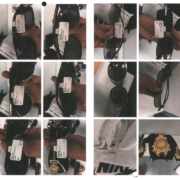San Diego County District Attorney Summer Stephan announced today that her office is addressing the intersection of homelessness and crime by leading the effort to develop technology that can quickly locate suitable shelter beds for individuals experiencing homelessness, improving on the process that’s currently in place.
The proposed technology would mobilize a more efficient county response, providing access to comprehensive and centralized information about the capacity, quantity, and availability of shelter beds and services across the county. The San Diego County Board of Supervisors voted today to clear the way for the DA’s Office to work with Tech Soup and its subsidiary, Caravan Studios, to move forward with the technology development phase of the application that would implement the community design vision already developed.
“We believe this investment in technology to support communication and coordination of homeless services will be the first-of-its kind in the nation, and will be grounded in transparency, equity and data,” said DA Stephan. “Previously it could take up to 10 days to connect someone with a homeless shelter bed and by the time service providers reach back out to someone on the street, they’re often gone. With this app that connection can happen in minutes.”
The DA’s Office currently supports a similar effort to address the needs of victims of crime needing shelter through the Safe Shelter Collaborative. Sheltering agencies that provide resources to survivors of human trafficking, domestic violence, and sexual assault can use an app to find shelter beds quickly for those attempting to escape violence.
Leveraging the positive outcomes of the Safe Shelter Collaborative and expanding this model to include all homeless populations will allow the county to maintain real time and accurate data regarding shelter use and availability and help to inform policy decisions regarding future needs and investments to better address homelessness. The app will also allow service providers, healthcare providers such as emergency room personnel, outreach teams and law enforcement to filter requests for shelter beds, allowing a better shelter match for someone who may have a pet, a child, is LGBTQ+, is elderly, or has physical disabilities, for example.
“Homelessness is a regional issue requiring innovative and collaborative solutions. Thank you to District Attorney Summer Stephan for bringing forward this proposal, which would result in another tool in our arsenal, connecting people with the resources they need and providing informative data to help us assess the root cause of housing insecurity,” said San Diego County Supervisor Nathan Fletcher. “The County must continue to search for and create long-term solutions to prevent, and ultimately, help San Diegans end their homelessness.”
“Our county has taken a bold approach to address the homelessness crisis currently impacting our communities by implementing innovative and creative ways of providing shelter and support,” said Nora Vargas, Chairwoman, San Diego County Board of Supervisors. “Today, with equity and confidentiality as our top priorities, we are adding one more means of ensuring we connect residents experiencing homelessness to shelter and a bed faster than ever before.”
In November 2022, the DA brought together dozens of stakeholders from the homeless outreach and support space to solicit input on opportunities for technology to address issues and problems associated with access to shelter for people experiencing homelessness in San Diego County. The resulting recommendations produced a community design that will serve as the basis for development of the shelter bed finder app.
“I appreciate the community coming together and rolling up their sleeves. Ultimately, this is being designed and informed by the people who are working on the front lines of homeless outreach and support, leveraging their experience,” DA Stephan said. “At the moment, some agencies are literally coordinating the search for a shelter bed using sticky notes. It’s our hope that participation in the app will be robust, making it a game changer in our community.”
Development of the app is anticipated to take about six months, with expanded participation among various stakeholders occurring within a year.
The DA’s Office recently released new data about the intersection of crime and the county’s population of persons experiencing homelessness. Multiple sources of credible data indicate that this vulnerable population is growing faster than the availability of housing and services. Two years of District Attorney data shows individuals who are experiencing homelessness become involved with the justice system as victims and offenders at higher rates than the rest of the population. The overdose rate for people experiencing homelessness is 118 times higher than the general population. We also know that being a victim of domestic violence, child abuse and human trafficking drives homelessness especially for women and children on our streets.
“Homelessness is a humanitarian and public safety crisis that many in our community are working on at every level. Addressing this crisis clearly requires multiple solutions and we believe this new app will be a game changer and support other ongoing positive efforts,” DA Stephan added. “We appreciate the support for this initiative from the Board of Supervisors, in particular Chair Nora Vargas and Past Chair Nathan Fletcher.”
In March 2022, the DA proposed a 3-prong approach to address the needs of individuals experiencing homelessness who intersect with law enforcement and the criminal justice system. This was a follow up to the DA’s 2019 Blueprint for Mental Health Reform: Addressing the Intersection of Mental Health, Homelessness and Criminal Justice in San Diego County. Development of this new app is the first ‘prong’ in the DA’s proposal.









